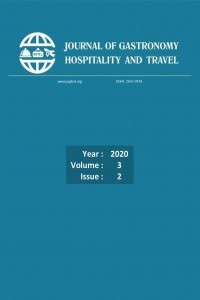CUSTOMERS’ PERCEPTIONS, EXPECTATIONS AND EXPERIENCES OF SERVICE QUALITY FOR HOTELS IN MUTARE, ZIMBABWE
CUSTOMERS’ PERCEPTIONS, EXPECTATIONS AND EXPERIENCES OF SERVICE QUALITY FOR HOTELS IN MUTARE, ZIMBABWE
This paper aims to expose the customers’ perceptions, expectations and experiences of service quality for hotels in Mutare, Zimbabwe. Netnography was used to collect data from Tripadvisor.com posts that were made from December 2018 to January 2020, the data was analysed using SERVQUAL themes. A total of eight hotels in Mutare city and those within the Vumba mountains trek were selected for this study. Results indicate that there is a difference between customers’ perceptions, expectations and experiences of service quality in hotels. A lot is desired to improve the tangibles, responsiveness and reliability in the hotels. It must be noted that the case hotels are not representative of the accommodation providers in Manicaland but representative of themselves. Nonetheless, they provide interesting entry points that help to draw conclusions relating to tourists’ views with relation to service quality in Manicaland. The study contributes to service sustainable quality management in hotels from the perspective of customers. A lot is desired to improve the furniture and fitting at the hotels, customer care and standardisation of service provision.
___
- Alauddin, M., Ahsan, S. H., Mowla, M. M., Islam, M., & Hossain, M. (2019). Investigating the Relationship between Service Quality, Customer satisfaction and customer loyalty in the hotel industry: Bangladesh perspective. Global Journal of Management and Business Research, 19(1).
- Baka, V. (2016). The becoming of user-generated reviews: looking at the past to understand the future of managing reputation in the travel sector. Tourism Management., 53(148–162).
- Basera, V., & Nyahunzwi, D. K. (2019). The Online Marketing Strategies of the Zimbabwe Tourism Authority (ZTA) and South Africa Tourism (SAT): A Comparative Study. Journal of Tourism and Hospitality Management, 8(1).
- Garvin, D. A. (1988). Managing Quality. The Strategic and Competitive Edge. New York: The Free Press.
- Getty, J. M., & Getty, R. L. (2003). Lodging Quality Index (LQI): Assessing Customers’ Perceptions of Quality Deliver. International Journal of Contemporary Hospitality Management, 15(2), 94–104.
- Gorondutse, A. H., & Hillman, H. (2014). Mediation effect of customer satisfaction on the relationships between service quality and customer loyalty in the Nigerian foods and beverages industry. International Journal of Management Science and Engineering Management, 9, 1–8.
- Gronroos, C. (1990). Relationship approach to marketing in service contexts: The marketing and organizational behavior interface. Journal of Business Research, 20.
- Hayes, K. D., Ninemeier, D. J., & Miller, A. A. (2011). Foundations of Lodging Management. London: Pearson Education.
- Jankalova, M. (2016). Service Quality—Object of Business Excellence Measuring. Review of European Studies, 8(2).
- Kleynhans, I. C., & Zhou, P. (2012). Service quality at selected hotels in Pretoria , South Africa. African Journal of Business Management, 6(45), 11342–11349. https://doi.org/10.5897/AJBM12.1132
- Kotler, P., & Armstrong, G. (2008a). Principles of Marketing. (12th ed.). New Delhi: Pearson Education.
- Kotler, P., & Armstrong, G. (2008b). Principles of Marketing (12th ed.). New Delhi: Pearson Education.
- Kozinets, R. V. (1998). On netnography: Initial reflections on consumer research investigations of cyber culture. Advances in Consumer Research, 25, 366–371.
- Ladhari, R. (2009). Service quality, emotional satisfaction, and behavioural intentions: A study in the hotel industry". Managing Service Quality:. An International Journal, 19(3), 308–331.
- Masrurul, M. M. (2019). Impact of Service Quality on Customer Satisfaction in Bangladesh Tourism Industry: An Empirical Study. Advances in Management, 12(1).
- Mkono, M. & Tribe, J. (2016). Beyond reviewing: uncovering the multiple roles of tourism social media users. Journal of Travel Research, 56(3), 1–12.
- Mmutle, T., & Shonhe, L. (2017). Customers ’ perception of Service Quality and its impact on reputation in the Hospitality Industry. African Journal of Hospitality, Tourism and Leisure, 6(3), 1–25.
- Parasuraman, A., & Zeithaml, V. A. (1985). A conceptual model of service quality and its implications for further research. Journal of Marketing, 49(46).
- Samori, Z., & Sabtu, N. (2014). Developing halal standard for Malaysian hotel industry: An exploratory study. Procedia-Social and Behavioral Sciences, , 12(1), Pp. 122-157, 12(1), 122–157.
- Tessera, F. A. (2016). Service Quality and Hotel’s Customer Satisfaction: An Empirical Evidence from Ethiopia. Electronic Journal of Business and Management, 1(1), 24–32.
- UNWTO. (2019). UNWTO World Tourism Barometer and Statistical Annex. Madrid.
- VA, Z., & Bitner, M. . (2003). Services marketing. New York: McGraw-Hill.
- Varki, S., & Colgate, M. (2001). The role of price perceptions in an intergrated model of behavioural intentions. Journal of Services Research, 3(3), 232–240.
- Walker, K., & Moscardo, G. (2016). Moving beyond sense of place to care of place: the role of Indigenous values and interpretation in promoting transformative change in tourists’ place images and personal values. Journal of Sustainable Tourism, 24(8-9), Pp. 1243-1261, 24(8–9), 1243–1261.
- Zhang, Z., Ye, Q., & Law, R. (2011). Determinants of hotel room price: an exploration of travellers’ hierarchy of accommodation needs. International Journal of Contemporary Hospitality Management, 23(7), 972–981.
- ISSN: 2619-9548
- Başlangıç: 2018
- Yayıncı: Rahman TEMİZKAN
Sayıdaki Diğer Makaleler
EVALUATION OF HISTORICAL AND CULTURAL AREAS AS A TOOL FOR CITY MARKETING: CASE OF ESKİŞEHİR PROVINCE
Simge ŞALVARCI, Fatmanur Kübra AYLAN
Vitalis BASERA, Godfrey MAKANDWA
Aziz ÇALIŞKAN, Norhidayah ABDULLAH, Noriza ISHAK
GENÇLERİN DESTİNASYON SEÇİMLERİNİ ETKİLEYEN FAKTÖRLERİN BELİRLENMESİNE YÖNELİK BİR ARAŞTIRMA
TÜRKİYE’NİN AV TURİZMİ POTANSİYELİ KONUSUNDA BİR DEĞERLENDİRME
TALAIOTIC CULTURAL HERITAGE AS A TOURISM RESOURCE IN THE BALEARIC ISLANDS
Asier BAQUERO, Rafael RIVELLES
MUTFAK DONATIMINDA GEREKÇELİ EKİPMAN ANALİZİ: HAZIRLIK EKİPMANLARI ÖRNEĞİ
FOOD CULTURE: GASTRONOMIC EXPERIENCES IN SINGAPORE
